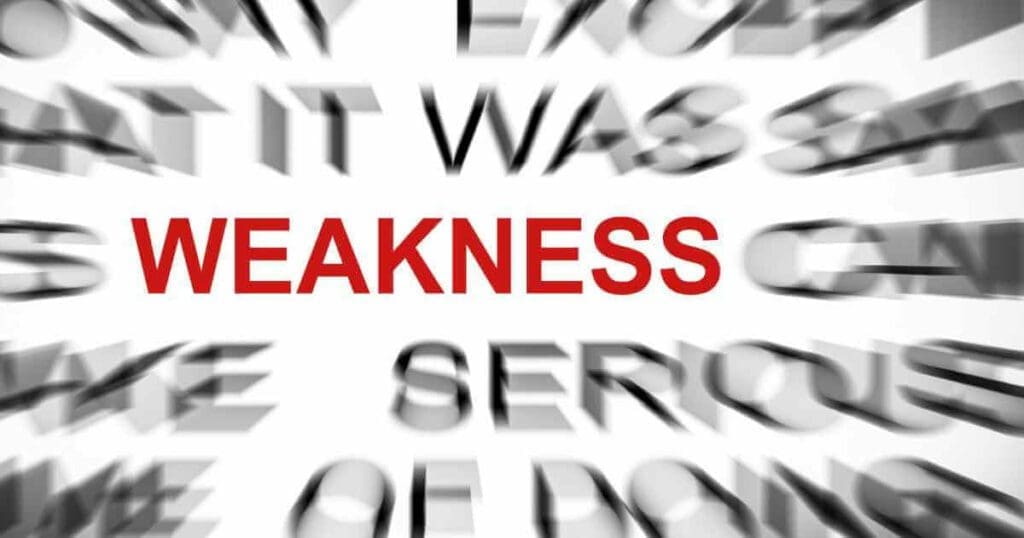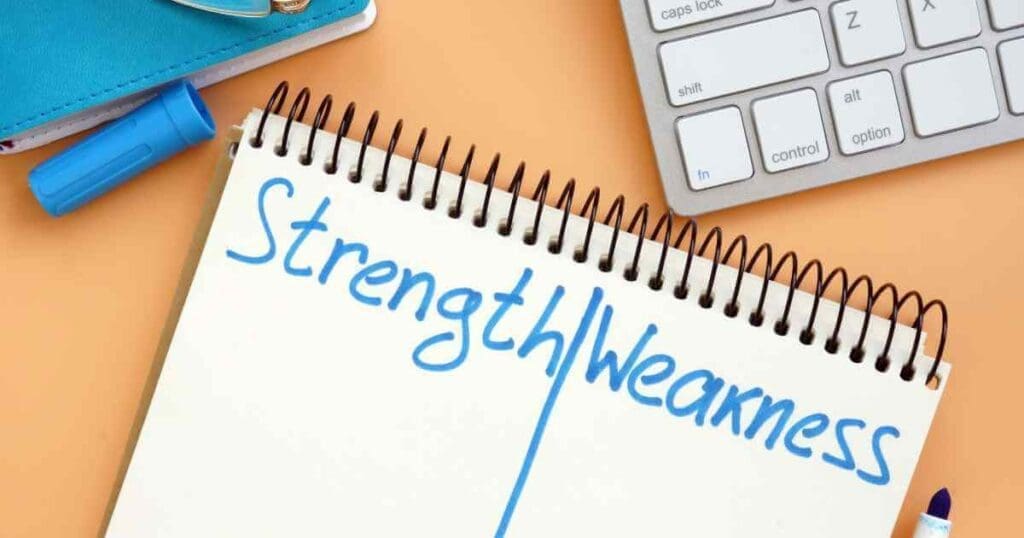The job interview is one of the most intimidating and nerve-wracking experiences that many of us will ever face. It is important to be prepared for the interview and know how to discuss your weaknesses. It is not easy to talk about your weaknesses in a job interview, but it is essential to approach the topic positively and professionally. In this blog post, we will discuss the best way to discuss your weaknesses in a job interview and how to present them in a way that will not hurt your chances of getting the job.
How to Answer “What is your biggest weakness?” Job Interview Question
- Focus on a challenge unrelated to the job
- Talk about how you’ve overcome your weakness
- Keep in positive
- Don’t follow a script
- Stick to work-related weaknesses
- Emphasize your plan of action
- Don’t say you’re a perfectionist or you work too hard
- Showcase your strengths
First, it is important, to be honest when discussing your weaknesses. Remember that we all have weaknesses; it is better to be upfront about them rather than try to hide them. It is also essential to focus on weaknesses unrelated to the job you are applying for so you don’t unintentionally raise a red flag. For example, if you are applying for a career in customer service, to showcase that you are the best candidate, you should not mention that you’re not good at problem-solving.
The next step with this difficult question involves emphasizing how you have worked to improve your weaknesses in your last job. Employers want to know that you are willing to work to improve yourself and that you can learn from your shortcomings in your new role. Talk about how you have improved your weaknesses and are now better equipped to handle the job.
Finally, it is essential to end positively when answering the weakness question. Talk about how you have taken the necessary steps to address your weaknesses and how you are now better prepared to handle the job. Show the interviewer that you are confident in your abilities and ready to take on the challenge. The following examples are a good place to start if you’re having difficulty thinking of an appropriate weakness.
Biggest Weakness Examples and Sample Answers For a Job Interview
- Lack of organization: Developed a system of tracking and organizing tasks to stay on top of deadlines.
- Unfamiliarity with technology: Took online courses to become proficient in the latest software and technology.
- Limited problem-solving skills: Practiced problem-solving techniques and strategies to become more adept at troubleshooting.
- Inadequate research skills: Read books and articles related to the industry to become more knowledgeable.
- Lack of leadership experience: Volunteered to lead projects and initiatives to gain more experience in this area.
- Unfamiliarity with industry trends: Kept informed on industry news and developments.
- Poor networking skills: Attended networking events and joined professional organizations to build my connections.
- Weak negotiation skills: Practiced negotiating tactics and strategies to become more confident in this area.
- Inadequate financial knowledge: Took finance classes to gain a better understanding of economic principles.
By following these tips for this common interview question, you can talk about your professional weaknesses in a positive and memorable way.
How to Talk About Your Weaknesses in an Interview
Interviewers that ask about weaknesses in a job interview are looking for examples of how a person faced obstacles and overcame them in the past. Recognizing that all job candidates have flaws and how they deal with failure and have made steps to fix them are indicators of how they will handle constructive criticism in the future.
Interviewers ask about weaknesses and failures because resiliency is a critical soft skill that all employees must have. Similarly, as a manager, you expect to give constructive criticism to your employees, and the ability of a person to take that and improve is essential when choosing who you will manage.
Avoid mentioning a weakness that can ruin your chances of landing the job. Before the interview, review the job description to see what exactly the employer’s qualifications are.
Penelope Trunk, a career coach and author of Brazen Careerist: The New Rules for Success, wrote in a blog post on the topic:
Do not give a bullshit answer,” Trunk writes. “Saying something like, ‘I pay too much attention to detail,’ is a terrible answer for someone getting hired to do detail work. It means you have a deficit in the exact area you’re trying to get hired for. The best answer to the question is when you give a truthful answer because it’s doubtful you will be utilized for the thing you are most weak at doing.
2. Talk About How You’ve Overcome Your Weakness
When discussing your weaknesses in a job interview, you must be honest and open about them. However, it is also important to emphasize how you have worked to overcome them, showing that you are self-aware and motivated to improve.
For example, if you have difficulty with public speaking, you can explain that you have taken steps to improve your confidence and communication skills. You can talk about how you have taken a public speaking course, practiced your presentations in front of a mirror, or even joined a Toastmasters group. This shows the interviewer that you are determined to work on your weaknesses and become a better candidate for the job.
3. Keep it Positive
It is important to keep your answers positive when discussing your weaknesses in a job interview because it shows the interviewer that you are self-aware, humble, and willing to learn and grow. Instead of focusing on the negative aspects of your weaknesses, discuss how you are actively working to improve them.
For example, if you struggle with time management in your current role, you could say, “I’m aware that I can sometimes struggle with time management, so I’ve been working on developing better habits to ensure I stay on track. I’ve implemented a system of reminders and to-do lists to help me stay organized and on top of my tasks.” This shows that you are aware of your weaknesses and willing to take the steps needed to improve them.
Finally, be sure to end on a positive note by emphasizing the strengths that you do have and how you can use them to benefit the company. This will leave a lasting impression on the interviewer and show them that you are the right fit for the job.
4. Don’t Memorize a Script
Jacquelyn Smith at Forbes does not recommend rehearsing your response.
Of course, you want to be prepared for every common interview question—especially tricky ones like this. Think about your weaknesses ahead of time, but don’t rehearse a response.
Your answer might change slightly according to the rest of the conversation with the hiring manager. Also, you don’t want it to appear unauthentic or staged.”
5. Stick to Work-Related Weaknesses
Sticking to work-related weaknesses in a job interview is crucial as it allows the interviewer to assess your self-awareness and how you have worked to improve upon your weaknesses. It also shows that you are honest and willing to take responsibility for your mistakes.
An example of a work-related weakness could be time management. To demonstrate how you have worked to improve upon this, you could explain that you have developed a system for keeping track of deadlines and prioritizing tasks. You could also mention that you have asked for help from colleagues or supervisors when needed.
6. Emphasize Your Plan of Action
When discussing weaknesses, it can be helpful to emphasize your plan of action for improving them.
For example, suppose you know that you have difficulty with problem-solving. In that case, you can explain that you are working on developing your analytical skills by taking online courses or attending seminars to better understand the problem-solving process. This shows the interviewer that you are committed to improving your weaknesses and taking proactive steps to do so.
7. Don’t Say You’re a Perfectionist or You Work Too Hard
Saying that you are a perfectionist or working too hard in an interview can be viewed as unfavorable. It may give the impression that you are challenging to work with, unwilling to collaborate, or cannot work well with others. It can also give the impression that you cannot handle criticism or feedback, which may be seen as a lack of self-awareness.
8. Showcase Your Strengths
When discussing weaknesses in a job interview, it is crucial to demonstrate self-awareness and humility.
One way to do this is to share your strengths when discussing your weaknesses as t, and this will show the interviewer that you know your strengths and weaknesses and can use both to your advantage. For example, suppose you are asked about a weakness in your communication skills. In that case, you can share that you are an introvert, making it difficult to communicate in certain situations.
However, you can also explain that you have worked hard to develop your communication skills and become an effective communicator in one-on-one and group settings. Similarly, suppose you are asked about a weakness in your organizational skills. In that case, you can explain that you can become easily overwhelmed with large tasks and can sometimes struggle to prioritize them.
You can also share that you are detail-oriented and have developed strategies to help you stay organized and on task. By sharing your strengths and weaknesses, you can demonstrate to the interviewer that you are self-aware and have a plan for using your strengths to overcome your weaknesses. This will show the interviewer that you are confident in your abilities and have the potential to become a strong and successful employee.
20 Example Answers: “What are your three biggest weaknesses?”
- Poor communication skills: Took a public speaking course to improve my presentation and communication abilities.
- Lack of organization: Developed a system of tracking and organizing tasks to stay on top of deadlines.
- Inability to work in a team: Participated in group projects to learn how to collaborate and work effectively with others.
- Unfamiliarity with technology: Took online courses to become proficient in the latest software and technology.
- Limited problem-solving skills: Practiced problem-solving techniques and strategies to become more adept at troubleshooting.
- Weak time management skills: Learned how to prioritize tasks and manage my time more efficiently.
- Inadequate research skills: Read books and articles related to the industry to become more knowledgeable.
- Low self-confidence: Practiced positive self-talk and self-affirmation to boost my self-esteem.
- Lack of leadership experience: Volunteered to lead projects and initiatives to gain more experience in this area.
- Inability to take initiative: Started taking on more responsibility and making decisions independently.
- Unfamiliarity with industry trends: Kept up-to-date on industry news and developments to stay informed.
- Poor networking skills: Attended networking events and joined professional organizations to build my connections.
- Weak negotiation skills: Practiced negotiating tactics and strategies to become more confident in this area.
- Inadequate financial knowledge: Took finance classes to gain a better understanding of financial principles.
- Fear of public speaking: Volunteered to speak at events to gain more confidence in this area.
- Unfamiliarity with business processes: Learned the basics of business operations to become more knowledgeable.
- Inability to deal with stress: Practiced stress management techniques to stay calm and focused.
- Lack of creativity: I took creative courses to become more innovative in my approach.
- Poor decision-making skills: Learned how to weigh the pros and cons to make smarter decisions.
- Inadequate customer service skills: Took customer service courses to learn how to better serve clients.
Top Considerations When You Talk About Your Weaknesses
Speak With Confidence
One way to speak confidently when discussing your weaknesses is to focus on how you are actively working to improve them in your professional life.
For example, instead of simply stating that you are not great at public speaking, you could mention that you have been taking a public speaking course to improve your skills in that area. This shows that you are aware of your weakness and are taking steps to address it, which can instill confidence in your audience. Additionally, framing your weakness as a challenge or opportunity for growth can also help to boost your confidence when discussing it.
Try to Balance Between Your Weak and Strong Points
When discussing your weak and strong points in an interview, it’s important to strike a balance between highlighting your strengths and acknowledging your weaknesses. One way to do this is to first focus on your strengths and discuss how they make you a good fit for the job. Then, briefly mention one or two areas where you have room for improvement and discuss how you are working on those areas.
For example, you could say something like:
I am a strong communicator, and I excel at working in teams. One area where I have room for improvement is time management, but I have been working on using a planner and setting priorities to help me stay organized.
This shows that you are aware of your weaknesses and taking steps to address them while highlighting your strengths.
Explain Your Past, Show Your Present and Decide Your Future
Talk about what weak/strong points you’ve faced, the ones you’re facing, and the ones you plan to face up to. Not only does this show your development as a person, but it also shows your capability to get up the corporate ladder.
Before we go…
In conclusion, answering the “What is your biggest weakness” question in a job interview can be daunting. However, by focusing on your soft skills, work ethic, personality traits, how you’re a team player, and your greatest strengths, you can craft a response that shows you in the best light during your next interview.
While it can be challenging for a job seeker to think of a real weakness you’re willing to discuss, it is important to be honest and provide examples of weaknesses that can be seen as a good fit for the job. It is also important to avoid spending too much time discussing your weaknesses, as this can create a negative impression. By focusing on your hard skills when discussing your greatest weaknesses, you can create a professional response that will leave you in a positive light to stand out from the crowd.
Some other common interview questions include “Tell me about yourself,” “What is your biggest achievement?” and “Why do you want to work here?” For more information on nailing your next interview, check out the latest job interview tips about evidence-based recruiting and behavioral interview questions and answers for management positions.




